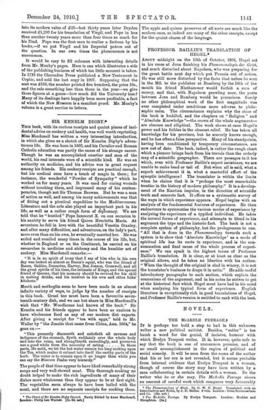SIR KENELM DIGBY.* Tars book, with its curious receipts and
quaint pieces of inci- dental advice on cookery and health, was well worth reprinting.
Miss Macdonell has written a very interesting introduction, in which she gives us a sketch of Sir Kenelm Digby's adven- turous life. He was born in 1603, and his Cavalier and Roman Catholic education was partly the cause of his strange career.
Though he was an accomplished courtier and man of the world, his real interests were of a scientific kind. He was an authority on medicine, and his advice was in great request among his friends. His cookery receipts are practical enough, but his medical ones have a touch of magic in them ; for instance, the wonderful "Powder of Sympathy" which he worked on for many years. It was used for curing wounds without touching them, and impressed many of his contem- poraries, though not Sir Thomas Browne. But he was a man of action as well, and among his many achievements was that of fitting out a piratical expedition to the Mediterranean. Literature and the arts also played an important part in his life, as well as a rather rough form of diplomacy. We are told that he " hustled " Pope Innocent X. on one occasion in his anxiety to serve his friend Queen Henrietta Maria. At seventeen he fell in love with the beautiful Venetia Stanley, and after many difficulties, and adventures, on the lady's part, more even than on his own, he eventually married her. He was exiled and recalled many times in the course of his life, but, whether in England or on the Continent, he carried on his researches in medicine and alchemy and the humbler art of cookery. Miss Macdonell remarks :-
" It is in no spirit of irony that I say of him who in his own day was looked on almost as Bacon's equal, who was the friend of Bacon, Galileo, Descartes, Harvey, Ben Jonson, Cromwell, and all the great spirits of his time, the intimate of Kings, and the special friend of Queens, that his memory should be revived for his skill in making drinks, and his interest in his own and other folks' kitchens."
Meath and metheglin seem to have been made in an almost infinite variety of ways, to judge by the number of receipts in this book. Gruel too must have been a favourite seven- teenth-century dish, and we can but share in Miss Macdonell's wish that " Mr. Woodhouse had known of the book." Sir
Kenelm and his friends appear to have been as anxious to have wholesome food as any of our modern diet experts. After giving a receipt for "tea with eggs," told to Mr.
Waller by " the Jesuite that came from China, Ann. 1664," he goes on :—
"This presently discnsseth and satisfieth all rawness and indigence of the stomach, flyeth suddainly over the whole body and into the veins, and strengthneth exceedingly, and preserves one a good while from the necessity of eating In these parts, He saith, we let the hot water remain too long soaking upon the Tea, which makes it extract into itself the earthy parts of the herb. The water is to remain upon it no longer than while you can say the Miserere Psalm very leisurely."
The people of that time appear to have liked remarkably strong soups and very well-stewed meat. This thorough cooking no doubt helped to make the rich ingredients of many of their dishes more wholesome than they appear to be at first sight.
The vegetables seem always to have been boiled with the meat, and there are no separate receipts for cooking them.
• The Closet of Sir Kenelm Digt, Opened. Newly Edited by Anne Macdonell. London: Philip Lee Warner. [7s. 6d. net.]
The apple and quince preserves of all sorts are much like the modern ones, as indeed are many of the other receipts, except for the quaint charm of the language.






































 Previous page
Previous page